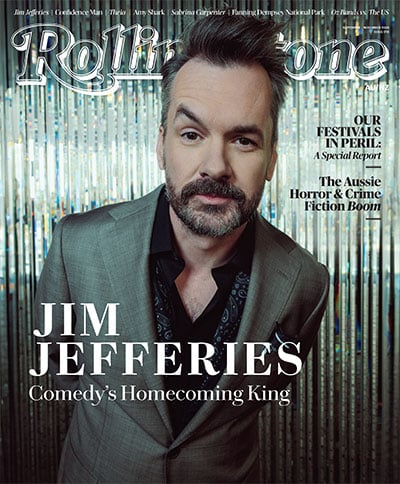As movie buffs are collectively recovering from the massive Sydney Film Festival, which ended this week, one of the most talked-about films to emerge has been Amy, which enjoyed two sold-out screenings during the festival.
Amy is a doco focused around British singer-songwriter Amy Winehouse, highly regarded as one of the greatest music talents of the 21st century. And while our reviewer thought that Amy was “an overwhelming tale and completely compelling viewing, despite knowing how the story ends”the film’s release has not passed by without its controversy, most notably from the Winehouse family’s reaction. In a statement released to the press, the family publicly distanced themselves from the film, saying that the documentary was a “missed opportunity to celebrate her life and talent and that it is both misleading and contains some basic untruths”.
This isn’t the first music documentary to be surrounded in controversy, whether it be for its portrayal of an artist, or the environment in which it was recorded. Here are four more of the most talked-about and controversial music films to ever hit the big screen…
Metallica: Some Kind Of Monster
The early 2000s were not a fantastic time for Metallica. Their last two studio albums had been the two highly forgetful Load and Reload. Drummer Lars Ulrich had finished his battle with Napster, which left thousands of Metallica fans with a bad taste in their mouth, and longtime bassist Jason Newsted had just left the band. It was at this moment that they begun working on their next album, which was paired with the documentary Some Kind Of Monster.
Depending on who you ask, Some Kind Of Monster is either an in-depth look at one of the biggest metal bands in history, or an absolute wankfest between three multi-millionaires.
The documentary delves into the lives of the three remaining members of Metallica while they try and record a new album, find a new bassist, and learn how to deal with each other after 20 years together. The album that came out of this time is the equally controversial St. Anger – one that received reviews ranging from calling it “a band playing with passions for the first time in years” to having the guitars described as “more processed than catfood”.
They’ve even had fans try and re-record the album to make it better. Metallica just can’t catch a break, huh.
Kurt Cobain: Soaked In Bleach
Your documentary has to be pretty controversial when Courtney Love is threatening legal action, right? Love is understandably not a fan of the just-released documentary Soaked In Bleach, which explores the famous theory that Kurt Cobain’s death was not a suicide, but in fact a murder plotted by Love herself. Just this week Love’s lawyers sent cease and desist letters to every cinema in the US planning to show the film.
Described as a ‘docu-drama’, the film in its new trailer seems to have a tacky mix of archival video and audio and dramatic recreations of pivotal points in the case.
The ‘Courtney Killed Kurt’ conspiracy theory is well-travelled, and there is no doubt that “three times the lethal dose of Heroin” is Generation X’s version of “jet fuel can’t melt steel beams”. But it’s the ‘docu-drama’ part that might be the most offensive thing about this film. We’ve been down this path too many times before, and if ‘dramatic recreations’ don’t help A Current Affair stories, why would it help this?
The film is getting negative reviews all across the US, and 2015 should be remembered by Nirvana fans instead for the excellent Montage Of Heck.
The Beatles: Let It Be
Let It Be, at the time, seemed like unrestricted access to The Beatles. The band famously stopped touring in the ’60s to focus soley on a studio output. That only added a layer of mystique to the rampant Beatlemania that infected the world. Let It Be naturally covers The Beatles recording the album of the same name – what would be the last Beatles album to be released (despite being recorded before Abbey Road).
The documentary still stands as an interesting look at the world’s most famous band, and was responsible for the now-iconic rooftop concert, but the cameras rolling around the clock in the studio did nothing to relieve tensions that were already building in the band. John Lennon described these as “the most miserable sessions on earth”.
The film even leaves out an episode in the studio where George Harrison told everyone that he was leaving the band. The rough cut also included a scene with John and Yoko Ono airing dirty laundry in front of the cameras. The making of Let It Be was a tumultuous time for The Beatles – a time that isn’t necessarily captured in the film, but it hangs in the air nonetheless.
Radiohead: Meeting People Is Easy
Meeting People Is Easy captured Radiohead through the lens of the media following the release of their seminal 1997 album, OK Computer. The documentary focuses on the writing, touring and promotion of the record, and contains a bunch of concert footage, abstract images, and various media appearances from the band.
The film serves as a critique of the American music industry in particular, which frontman Thom Yorke compares to “a fridge buzzing”. It captures the media’s response to Radiohead, and well as the band’s response to the media. OK Computer and the subsequent touring ended in near mental breakdown for Yorke.
Sex Pistols: The Filth & The Fury
It’s probably fitting that one of the most controversial bands in history have a controversial documentary to go with it. The controversy in question is that, even when put to tape, it’s clear there is still a huge argument about the creation of the Sex Pistols.
The usual things are covered here – the rise and fall of one of the first-ever punk bands. It covers their initial burst in popularity, the news headlines they made throughout the world with their antics, the hiring of Sid Vicious (a man who couldn’t play bass), and the subsequent breaking up and breaking apart of the band.
What John Lydon and co. refuse to admit, however, is that all of this was spearheaded by Malcolm McLaren, their manager, who called the Sex Pistols his “own personal art project”.
In the film there is an obvious divide between how McLaren and Lydon consider the band to be. McLaren, at heart, thought of the Sex Pistols as a business, a way to court controversy and media attention, and originally just to plug his shop, SEX, which sold punk clothing.
Lydon, naturally, had an opposing view (which is so unlike him, isn’t it?). In his opinion, the Sex Pistols were a tour de force, a rallying cry against the unjust aspects of society, a big ‘fuck you’ to the corporate world that does stuff like puts logos on credit cards, and makes ads for butter… oh, whoops.


































